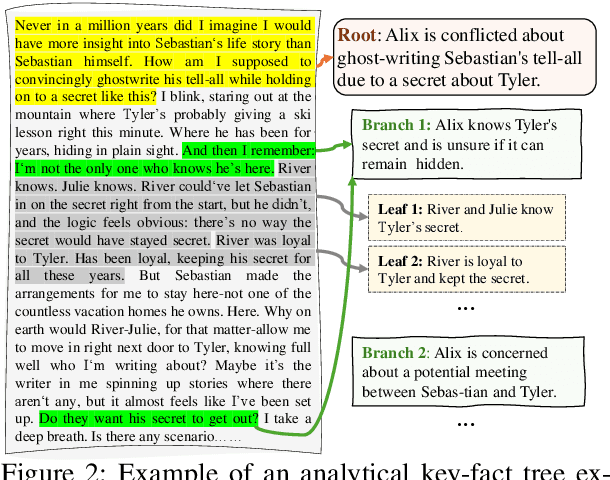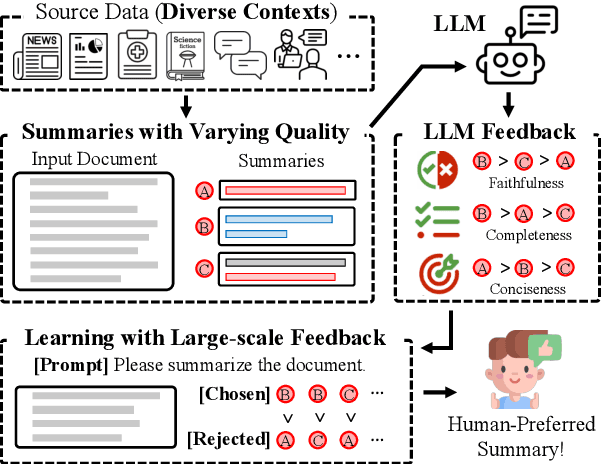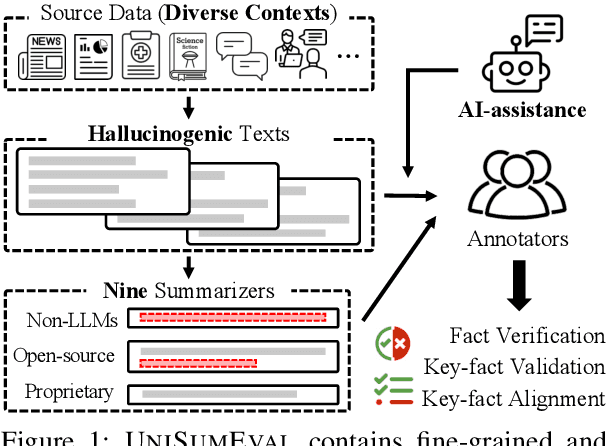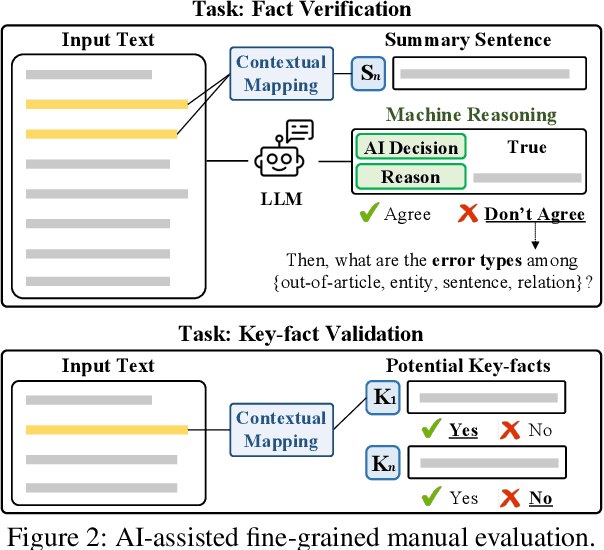Yuho Lee
Towards a Holistic and Automated Evaluation Framework for Multi-Level Comprehension of LLMs in Book-Length Contexts
Aug 27, 2025



Abstract:We introduce HAMLET, a holistic and automated framework for evaluating the long-context comprehension of large language models (LLMs). HAMLET structures source texts into a three-level key-fact hierarchy at root-, branch-, and leaf-levels, and employs query-focused summarization to evaluate how well models recall and faithfully represent information at each level. To validate the reliability of our fully automated pipeline, we conduct a systematic human study, showing that our automatic evaluation achieves over 90% agreement with expert human judgments, while reducing the cost by up to 25 times. HAMLET reveals that LLMs struggle with fine-grained comprehension, especially at the leaf level, and are sensitive to positional effects like the lost-in-the-middle. Analytical queries pose greater challenges than narrative ones, and consistent performance gaps emerge between open-source and proprietary models, as well as across model scales. Our code and dataset are publicly available at https://github.com/DISL-Lab/HAMLET.
ReFeed: Multi-dimensional Summarization Refinement with Reflective Reasoning on Feedback
Mar 27, 2025Abstract:Summarization refinement faces challenges when extending to multi-dimension. In this paper, we introduce ReFeed, a powerful summarization refinement pipeline that enhances multiple dimensions through reflective reasoning on feedback. To achieve this, we release SumFeed-CoT, a large-scale Long-CoT-based dataset optimized for training a lightweight model with reflective reasoning. Our experiments reveal how the number of dimensions, feedback exposure, and reasoning policy influence refinement performance, highlighting reflective reasoning and simultaneously addressing multiple feedback is crucial to mitigate trade-off between dimensions. Furthermore, ReFeed is robust to noisy feedback and feedback order. Lastly, our finding emphasizes that creating data with a proper goal and guideline constitutes a fundamental pillar of effective reasoning. The dataset and model will be released.
Learning to Summarize from LLM-generated Feedback
Oct 17, 2024



Abstract:Developing effective text summarizers remains a challenge due to issues like hallucinations, key information omissions, and verbosity in LLM-generated summaries. This work explores using LLM-generated feedback to improve summary quality by aligning the summaries with human preferences for faithfulness, completeness, and conciseness. We introduce FeedSum, a large-scale dataset containing multi-dimensional LLM feedback on summaries of varying quality across diverse domains. Our experiments show how feedback quality, dimensionality, and granularity influence preference learning, revealing that high-quality, multi-dimensional, fine-grained feedback significantly improves summary generation. We also compare two methods for using this feedback: supervised fine-tuning and direct preference optimization. Finally, we introduce SummLlama3-8b, a model that outperforms the nearly 10x larger Llama3-70b-instruct in generating human-preferred summaries, demonstrating that smaller models can achieve superior performance with appropriate training. The full dataset will be released soon. The SummLlama3-8B model is now available at https://huggingface.co/DISLab/SummLlama3-8B.
UniSumEval: Towards Unified, Fine-Grained, Multi-Dimensional Summarization Evaluation for LLMs
Sep 30, 2024



Abstract:Existing benchmarks for summarization quality evaluation often lack diverse input scenarios, focus on narrowly defined dimensions (e.g., faithfulness), and struggle with subjective and coarse-grained annotation schemes. To address these shortcomings, we create UniSumEval benchmark, which extends the range of input context (e.g., domain, length) and provides fine-grained, multi-dimensional annotations. We use AI assistance in data creation, identifying potentially hallucinogenic input texts, and also helping human annotators reduce the difficulty of fine-grained annotation tasks. With UniSumEval, we benchmark nine latest language models as summarizers, offering insights into their performance across varying input contexts and evaluation dimensions. Furthermore, we conduct a thorough comparison of SOTA automated summary evaluators. Our benchmark data will be available at https://github.com/DISL-Lab/UniSumEval-v1.0.
AutoCycle-VC: Towards Bottleneck-Independent Zero-Shot Cross-Lingual Voice Conversion
Oct 10, 2023Abstract:This paper proposes a simple and robust zero-shot voice conversion system with a cycle structure and mel-spectrogram pre-processing. Previous works suffer from information loss and poor synthesis quality due to their reliance on a carefully designed bottleneck structure. Moreover, models relying solely on self-reconstruction loss struggled with reproducing different speakers' voices. To address these issues, we suggested a cycle-consistency loss that considers conversion back and forth between target and source speakers. Additionally, stacked random-shuffled mel-spectrograms and a label smoothing method are utilized during speaker encoder training to extract a time-independent global speaker representation from speech, which is the key to a zero-shot conversion. Our model outperforms existing state-of-the-art results in both subjective and objective evaluations. Furthermore, it facilitates cross-lingual voice conversions and enhances the quality of synthesized speech.
 Add to Chrome
Add to Chrome Add to Firefox
Add to Firefox Add to Edge
Add to Edge